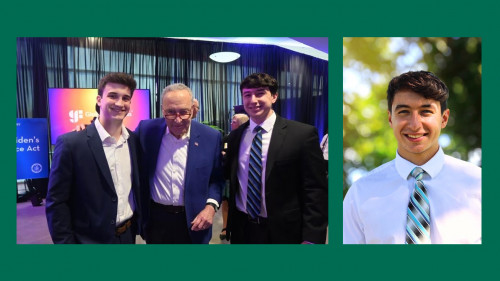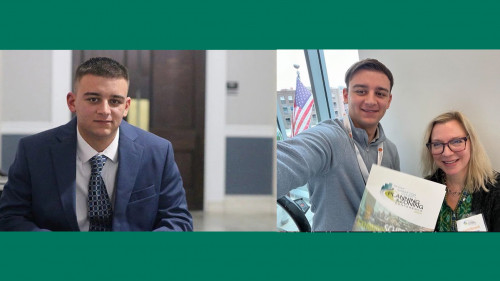
What apparel, hairstyles, cosmetics and even bodies pass the test for what’s considered “professional”? How have these perceptions changed in recent years, and how much further does our society have to go to ensure that all physical appearances and expressions are welcome in the workplace?
A collection of activities addressing these topics and others was hosted April 17 in the SSU. The event was organized by Kayzjah Charles ’23 as part of her honors seminar on Body Politics with Laurie Naranch Ph.D., professor of political science and international relations.
“What is considered normative professional work attire is often what a white, male, white-collar worker wears,” said Charles. “The further you get away from this norm, the more questions or concerns arise, about how diverse bodies are supposed to adhere to this performance within the workplace, which is a reflection of the microcosm of everything else in our society.”
The panel discussion “Modes of Professionalism: Body, Career, Communication” explored those issues with commentary by Beverly Yuen-Thompson, Ph.D., professor of sociology at Siena, and Reign Kinseley, an administrative associate for Patio.com.
Yuen-Thompson noted that “your freedom of self-expression grows with your job security and level of experience,” but said it was important to keep in mind that certain forms of that expression (such as tattoos) are outside of protected employee rights.
“There are no hard and fast answers,” she said. “These are issues still to be navigated.”
They explored such topics as “code-switching,” where a minority or stigmatized group downplays their colloquial customs to assimilate to the dominate culture’s norms, specifically those that guide workplace behavior, and how employees can maintain an authentic sense of self without becoming burned out or socially depleted.
The event also featured a well-stocked Free Use Closet, tabling on menstrual products and activism, and a sewing station for those wanting to learn how to make quick clothing repairs.
The Free Use Closet featured casual, party and professional clothes that were available – yes, totally free of charge – for any attendee. The initiative, which was the brainchild of Kiley Lenahan ’23, was first hosted on campus in 2021 and has made several pop-up appearances on campus since then. Students can bring in clothes they don’t need/want/like anymore and fellow Saints can pick up a few items that are new to them. This recycling and sharing of clothing saves everyone money and reduces consumption.
Organizers are working with Siena administrators to find a permanent home on campus for the Free Use Closet so students can access and donate items on a regular basis. Another proposal for the campus community: a “period pantry” to offer free menstrual products (which can be pricey) for those in need.
Maggie Frechette ’24 helped run the Free Use Closet, with Emma Ryan ’24 assisting at the sewing table.
“Helping to run the Free Use Closet was very enjoyable in the sense that I got to contribute to an environmentally friendly event that supports students within the Siena community,” said Frechette. “The idea of the Closet and a period pantry becoming a permanent part of campus is so exciting and would be greatly beneficial to the student body. I hope all the attendees of the event recognized the necessity of having these resources on campus and will continue to support them in the future.”
Ryan noted that the ability to mend and alter clothing is an integral part of the sustainability movement in the fashion industry.
“It was so wonderful to be able to not only share my passion for sewing, but to teach others how to repair the clothes already in their closets,” she said. “I am so grateful to be a part of a community that provides education on so many important topics, including sustainability and diversity in the fashion industry.”
The Sr. Thea Bowman Center for Women, the Environmental Club, and the theater program’s costume shop collaborated on the event.
“It was gratifying to have a space for discussion around embodiment and leadership in the workplace, to give students access to the Free Use Closet pop up, and to have the sustainability tables for menstrual products,” said Naranch. “We’re hoping to continue these initiatives going forward.”

